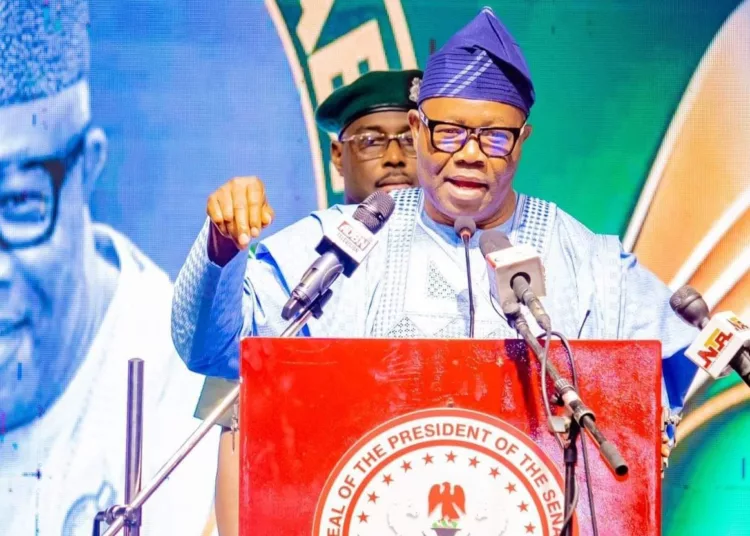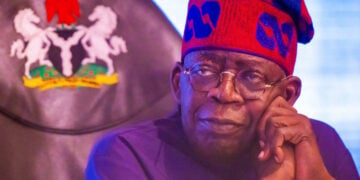Senate President Godswill Akpabio, Deputy Speaker of the House of Representatives, Rep. Benjamin Kalu, and leaders of all registered political parties under the Inter-Party Advisory Council (IPAC) on Monday rallied together to chart a new course for democratic renewal, inclusion, and institutional reform in the ongoing constitution review.
The high-level engagement, convened by the House of Representatives Committee on Constitution Review, held in Abuja, brought together national chairmen, secretaries, and women leaders of political parties to deliberate on proposed amendments covering judicial and electoral reforms, local government autonomy, women’s representation, state policing, and human rights.
In his keynote address, Senator Tahir Mongonu, who represented the Senate president, called political leaders to see the Constitution as a living document that must evolve with the nation’s changing realities.
“We are here because we share one belief that our Constitution must live, breathe, and grow with the times,” he said. “This engagement with political parties is not routine; it is historic. It says to the world that Nigeria’s democracy is alive and still learning, still listening, and leading.”
Mongonu described the issues under review from judicial reform to women’s inclusion and local government autonomy as “the heartbeats of the Republic,” stressing that democracy must endure and deliver.
He warned that electoral credibility and justice remained the twin pillars of a functioning democracy.
“An election is not a ceremony but the soul of democracy. When elections fail, trust dies. When justice delays, faith decays, Mongonu declared.
He called for a strengthened Independent National Electoral Commission (INEC) and a judiciary insulated from corruption and political pressure, noting that countries like India and South Africa have successfully reformed their institutions to uphold electoral integrity and judicial independence.
Turning to grassroots governance, Akpabio argued that “true federalism begins at the village level”, urging the devolution of power and resources to the local governments to make democracy tangible to citizens.
On gender representation, he passionately pleaded for Nigeria to move beyond rhetoric to policy-backed inclusion, noting global examples of how women’s leadership has transformed nations.
“A democracy that sidelines its women weakens itself. Where women rise, nations thrive. It is time for Nigeria to move from the language of sympathy to the policy of inclusion,” he said.
Akpabio also supported calls for state policing, describing it as a pragmatic response to Nigeria’s security realities.
“The call for state policing is not rebellion; it is realism,” he stated. “But in seeking safety, we must not sacrifice freedom. The hand that guards must not gag.”
The Senate President reaffirmed the National Assembly’s commitment to collaborate with all stakeholders, adding that the constitutional review is a movement, not a monument.
“If we stay true to the ideals of justice, inclusion, and accountability, future generations will say of us: here were leaders who did not merely speak of change but made it,” he concluded.
In his remarks, Deputy Speaker Benjamin Kalu, who also chairs the House Committee on Constitution Review, said the engagement marked the most inclusive and consultative amendment process in Nigeria’s democratic history.
Reflecting on 26 years of democratic rule since the 1999 Constitution, Kalu said the time had come to ask whether the nation’s governance framework still reflected its people’s aspirations.
“This is a moment of reckoning,” he said. “We must ask whether our Constitution is still fit for purpose, whether it serves the Nigeria we are today or remains tied to the Nigeria of a bygone era.”
Kalu said that while democracy has deepened through multiple elections and peaceful power transfers, too many Nigerians, especially women and local communities, still feel excluded.
“Political parties are not just participants in our democracy; they are its backbone,” Kalu said. “If these amendments must endure, they must reflect a broad consensus that transcends party lines.”
He outlined the Committee’s priorities to include guaranteed legislative seats for women, financial autonomy for local governments, and streamlined electoral litigation to ensure that elections reflect the people’s will.
“Goodwill alone is not enough to sustain democracy,” Kalu warned. “We need strong institutions, clear rules, and a Constitution enabling democracy.”
Also speaking, Mr Yusuf Mamman Dantalle, National Chairman of the Inter-Party Advisory Council (IPAC), lauded the National Assembly for driving what he described as a “patriotic and visionary review process” to restore faith in the electoral system.
He reaffirmed IPAC’s long-standing advocacy for constitutional and electoral amendments to consolidate and deepen Nigeria’s democracy, particularly after repeated lapses in past election cycles.
“As the platform that produces all elected public officers, IPAC is committed to ensuring a fair, transparent, and inclusive electoral process where every political party enjoys a level playing field,” Dantalle stated.
Presenting IPAC’s formal recommendations, Dantalle proposed several key reforms, including:
Scrapping State Independent Electoral Commissions (SIECs) and empowering INEC to conduct all 774 local government elections to ensure credible grassroots polls.
Establishing an Independent Appointment Committee (IAC) comprising representatives from political parties, civil society, the National Judicial Council, and the National Assembly to appoint INEC officials strengthens the Commission’s independence.
Restoring public funding for political parties with mechanisms for transparent financial records.
Creating an Electoral Offences Commission to prosecute electoral crimes such as vote-buying, ballot snatching, and result falsification.
Replacing vacant legislative seats caused by defection or death through the original political party rather than expensive by-elections
Dantalle further expressed support for special legislative seats for women, emphasising that gender inclusion in decision-making is central to democratic justice and stability.
“When a section of society is underrepresented in policy discussions, they feel marginalised. Empowering women strengthens democracy,” he said.
He concluded with optimism that this amendment process would finally give Nigerians a “people’s Constitution”, one built on equality, justice, and the protection of fundamental rights.





